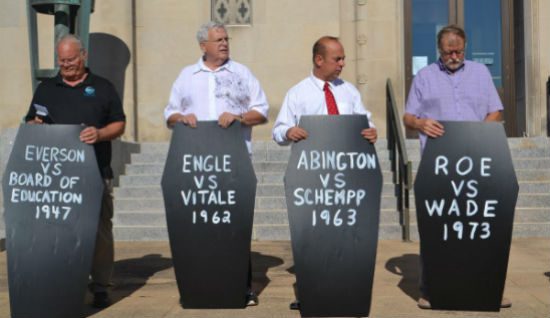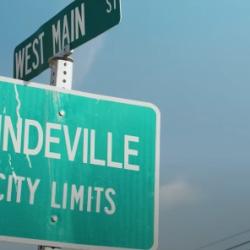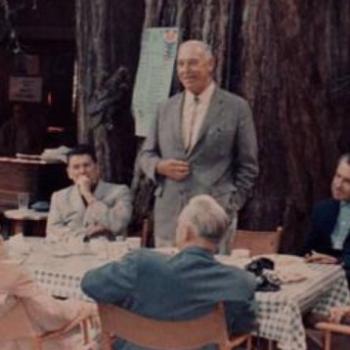Messiah College historian John Fea cuts to the heart of the matter of “The No. 1 reason evangelicals still put their hopes in Trump.” It’s the Supreme Court.*
This is why white evangelicals will vote for Trump. It’s why they would vote for any Republican. And for every Republican. Always.

Granted, the logic of this is a bit fuzzy. Concern for Supreme Court justices can explain a pattern of voting for presidential candidates — those who might one day appoint such justices. And it can explain a pattern of voting for candidates for the U.S. Senate — where justices are confirmed or rejected (or, if the president nominating them is black, just ignored forever). But this preoccupation with the make-up of the Supreme Court makes less sense as an explanation for hyper-partisan voting by white evangelicals for members of the House, for state legislatures, county commissioners, dog catchers and registers of wills.
Still, Fea ably summarizes the background and the apparent logic of this notion:
… many of Trump’s evangelical supporters are still using the 40-year-old political playbook written by Jerry Falwell, Pat Robertson and other founders of the so-called Christian right.
There is not a lot of nuance or complexity in this playbook. In fact, its approach to presidential politics is quite simple: Vote for the candidate who opposes abortion and will appoint Supreme Court justices who will overturn Roe v. Wade, the 1973 case that lifted most government-based restrictions on the practice.
Though we have heard a lot of talk in the last decade about the Christian right’s steady decline as more younger evangelicals expand their Christian vision of politics to include the alleviation of poverty, the protection of the environment, the fight against slave trafficking and the pursuit of racial reconciliation, their parents still believe abortion, gay marriage, religious freedom and opposition to LGBT rights should be at the center of an evangelical political witness. And the fate of these issues rests on the Supreme Court.
This is why prominent evangelicals such as theologian Wayne Grudem, author Eric Metaxas, Liberty University President Jerry Falwell Jr. and Dallas megachurch pastor Robert Jeffress have told their followers that a vote for Trump is a moral vote.
We could interrogate that a bit more — exploring what other things Grudem, Metaxas, Falwell Jr. and Jeffress have in common. But let that pass for now.
We’ll also want to get back to the underlying logic of this Supreme-Court-Above-All voting playbook to explore the anti-abortion premise of it. It’s internally consistent with that premise, but the problem is that nothing else these folks do is internally consistent with that premise. Like I said, we’ll get back to that later.
For now, let’s just discuss the effect of this voting strategy. Because the best that can be said for it is that it hasn’t worked.
The best that can be said for this white evangelical voting strategy is that it intended to produce an overturn of Roe v. Wade (and of Lawrence v. Kansas, and of Griswold v. Connecticut, and of Engel v. Vitale, and of …). But instead of that, what it produced was the Roberts Court’s ruling in Shelby County v. Holder, ripping out the guts of the Voting Rights Act.
Scott Lemiuex summarizes the indefensible rot of that Shelby County decision:
The Roberts Court’s evisceration of the most important civil-rights legislation passed since Reconstruction was its lowest moment. The impact of the decision to reverse a key part of the Voting Rights Act is anti-democratic, allowing numerous illegal voter-suppression schemes to go into effect, and making it much more difficult to stop them. But what makes Shelby County especially egregious is its threadbare legal reasoning, which can’t even be called “constitutional law.” The Constitution unambiguously gives Congress the power to enforce the 15th Amendment. The “equal sovereignty of the states” doctrine that the chief justice used to trump Congress’s explicit powers is a Roberts invention, and he has yet to identify any constitutional basis or Supreme Court precedent for it. Even setting aside his failure to base it on the text of the Constitution, Roberts’s argument — that Congress once had the relevant power but no longer does because the statute was too effective at protecting the rights it was intended to — defies logic. As Justice Ruth Bader Ginsburg noted in a dissent that gets the better of the Roberts majority opinion on every point, this argument makes as much sense as “throwing away your umbrella in a rainstorm because you are not getting wet.”
Again, this is the best that can be said of white evangelicals’ Supreme Court voting strategy: That it aimed to repeal Roe v. Wade and wound up repealing the Voting Rights Act instead.
But that may not be completely accurate. It may be worse than that. Particularly if we consider the actual history of the religious right that has been promoting this strategy so successfully over the past 40 years. That religious right didn’t form as a response to Roe v. Wade. It formed as a response to Green v. Connally — as a backlash against federal efforts to restrict the tax-benefits enjoyed by segregationist religious schools.
In other words, the repeal of the Voting Rights Act wasn’t an accidental side effect of the white evangelical strategy of Supreme-Court-based voting. It was the intended, deliberate result of that.
But for folks like Jerry Falwell Jr., Pat Roberson, Robert Jeffress, et. al., there’s still work to be done. They want white evangelicals to vote for Donald Trump based on the Supreme Court because they need that Supreme Court to keep pressing their agenda.
After all, Brown v. Board of Education is still on the books.
– – – – – – – – – – – –
* As I was writing this post, Donald Trump weighed in with further comments on why the selection of Supreme Court justices should be the paramount concern in this election:
He said that Mrs. Clinton would put liberal justices on the Supreme Court if she wins the presidency in November, threatening gun ownership rights.
Speaking at a rally in North Carolina, Mr. Trump hinted that gun rights advocates could stop her taking power.
To be fair, in context, it’s not clear that Trump was directly advocating that someone shoot his opponent. He may instead have been suggesting that people shoot liberal justices or anyone nominated to the courts by a President Clinton. Or, perhaps, he was simply suggesting that his supporters shoot ordinary citizens that may plan on voting for Clinton.















